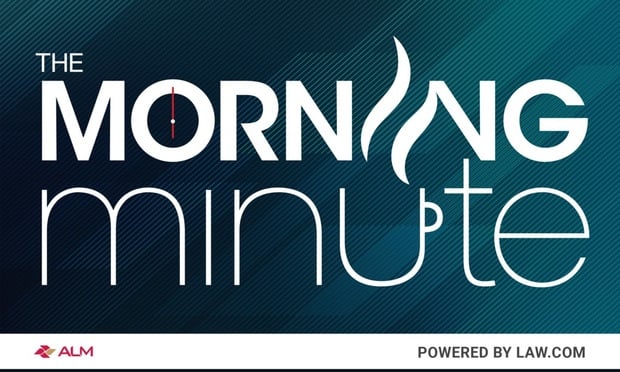So Far, Firms Not Planning to Require Vaccinations | Why Litigation Over Texas Power Outages Faces Long Odds | Ex-Client Sues Law Firm Over Involuntary Bankruptcy Proceeding: The Morning Minute
The news and analysis you need to start your day.
February 24, 2021 at 06:00 AM
5 minute read
Want to get this daily news briefing by email? Here's the sign-up.
WHAT WE'RE WATCHING
SHOTS ALL AROUND? - Davis Wright Tremaine was the first—and, so far, only—Am Law firm to publicly say it would mandate vaccination for attorneys who want to return to the office. And now it's looking like they may not have much company. As Law.com's Dylan Jackson reports, few Am Law 200 firms appear to be following Davis Wright's lead as the legal industry gears up for an expected return to in-person work by the second half of the year. Fish & Richardson, McGuireWoods, Stoel Rives and Shook Hardy have all said they will likely not require proof of vaccination as a condition to returning to their offices. Firms such as Proskauer Rose and Debevoise & Plimpton, meanwhile, have yet to decide. The trend tracks with a recent study by Gartner, which surveyed 236 human resources, legal, compliance and privacy leaders in December 2020 and January 2021, and found that only 8% of respondents said they will require their employees to get a COVID vaccines, though roughly 71% said they would "encourage" vaccination.
POWER STRUGGLE - Lawyers in Texas and elsewhere are gearing up for a fight in court over damages stemming from power outages that blanketed the Lone Star State during February's epic winter storm, Law.com's Amanda Bronstad reports. But suing electrical utilities can be tough sledding. For one thing, the lawsuits allege that the Electric Reliability Council of Texas, the independent system operator for 26 million Texas residents who make up 90% of the state's electric load, is liable for failing to winterize equipment after past storms. But, as Heather Payne, associate professor of law at Seton Hall University School of Law in Newark, New Jersey, noted, ERCOT does not own the power plants. Nor does it control the weather. "There isn't any claim in Texas, at least that I have heard being made, that ERCOT's actions caused the weather. The weather caused the outages," Payne said.
OWE NO - A former client sued Minnesota law firm Morrison Sund yesterday in Pennsylvania Eastern District Court for abuse of process. Henry Stursberg, the owner of a Philadelphia mortgage brokerage and financial consulting firm, contends that the law firm wrongfully filed an involuntary bankruptcy petition against him to gain leverage in a fee dispute. "By using the 'hammer' of an involuntary bankruptcy proceeding as a debt collection device as to a disputed two party account, Morrison Sund used legal process against the Plaintiff for a purpose for which the process was not designed," the complaint alleges. Stursberg is represented by Wilentz, Goldman & Spitzer. Counsel have not yet appeared for Morrison Sund. The case is 2:21-cv-00825, Stursberg v. Morrison Sund PLLC. Stay up on the latest deals and litigation with the new Law.com Radar.
EDITOR'S PICKS
With Retroactive 2-Year Suspension, Did Court 'Underplay' Gordon Caplan's Wrongdoing? By Jason Grant
Five Great Fitness Trackers for Optimizing Health, Performance and Diet By Jonathan Jordan
WHILE YOU WERE SLEEPING
BOUTIQUE'S BACK, ALRIGHT - Law.com International's Krishnan Nair is tracking a new trend in the U.K. and Europe: lawyers at the peak of their powers cutting away from their lucrative careers in elite private practices to start their own boutiques. The most high profile of these moves came at the start of February when a 38-strong Paris-headquarted arbitration team left Shearman & Sterling. But that was the continuation of a wider trend over the last 12 months, especially in the disputes world. One partner working at a boutique explained the growing appeal of such ventures, which he said are no longer reserved only for partners in the twilight of their careers. "It's the autonomy you just don't get in traditional practices," he said. "Boutiques are looking like an increasingly charming and fruitful way out of stiff politicized private practices."
WHAT YOU SAID
"I would tell an associate who wants to make partner that they should view the partnership as something to join, not just something to achieve."
— Britney Willhite, partner at Irvine, California-based Allen Matkins, on the best piece of advice she could give an ambitious associate.
This content has been archived. It is available through our partners, LexisNexis® and Bloomberg Law.
To view this content, please continue to their sites.
Not a Lexis Subscriber?
Subscribe Now
Not a Bloomberg Law Subscriber?
Subscribe Now
NOT FOR REPRINT
© 2025 ALM Global, LLC, All Rights Reserved. Request academic re-use from www.copyright.com. All other uses, submit a request to [email protected]. For more information visit Asset & Logo Licensing.
You Might Like
View All
Internal GC Hires Rebounded in '24, but Companies Still Drawn to Outside Candidates
4 minute read
Dissenter Blasts 4th Circuit Majority Decision Upholding Meta's Section 230 Defense
5 minute read

From Laggards to Tech Founders: Law Firm Innovation Is Flourishing
Law Firms Mentioned
Trending Stories
- 1How I Made Office Managing Partner: 'Always Be Willing to Work Harder Than the Person Next to You,' Says Esther Cho of Stradley Ronon
- 2People in the News—Feb. 10, 2025—Flaster Greenberg, Tucker Arensberg
- 3The Support Center for Child Advocates Welcomes New Executive Director
- 4'Shame on Us': Lawyer Hits Hard After Judge's Suicide
- 5Upholding the Integrity of the Rule of Law Amid Trump 2.0
Who Got The Work
J. Brugh Lower of Gibbons has entered an appearance for industrial equipment supplier Devco Corporation in a pending trademark infringement lawsuit. The suit, accusing the defendant of selling knock-off Graco products, was filed Dec. 18 in New Jersey District Court by Rivkin Radler on behalf of Graco Inc. and Graco Minnesota. The case, assigned to U.S. District Judge Zahid N. Quraishi, is 3:24-cv-11294, Graco Inc. et al v. Devco Corporation.
Who Got The Work
Rebecca Maller-Stein and Kent A. Yalowitz of Arnold & Porter Kaye Scholer have entered their appearances for Hanaco Venture Capital and its executives, Lior Prosor and David Frankel, in a pending securities lawsuit. The action, filed on Dec. 24 in New York Southern District Court by Zell, Aron & Co. on behalf of Goldeneye Advisors, accuses the defendants of negligently and fraudulently managing the plaintiff's $1 million investment. The case, assigned to U.S. District Judge Vernon S. Broderick, is 1:24-cv-09918, Goldeneye Advisors, LLC v. Hanaco Venture Capital, Ltd. et al.
Who Got The Work
Attorneys from A&O Shearman has stepped in as defense counsel for Toronto-Dominion Bank and other defendants in a pending securities class action. The suit, filed Dec. 11 in New York Southern District Court by Bleichmar Fonti & Auld, accuses the defendants of concealing the bank's 'pervasive' deficiencies in regards to its compliance with the Bank Secrecy Act and the quality of its anti-money laundering controls. The case, assigned to U.S. District Judge Arun Subramanian, is 1:24-cv-09445, Gonzalez v. The Toronto-Dominion Bank et al.
Who Got The Work
Crown Castle International, a Pennsylvania company providing shared communications infrastructure, has turned to Luke D. Wolf of Gordon Rees Scully Mansukhani to fend off a pending breach-of-contract lawsuit. The court action, filed Nov. 25 in Michigan Eastern District Court by Hooper Hathaway PC on behalf of The Town Residences LLC, accuses Crown Castle of failing to transfer approximately $30,000 in utility payments from T-Mobile in breach of a roof-top lease and assignment agreement. The case, assigned to U.S. District Judge Susan K. Declercq, is 2:24-cv-13131, The Town Residences LLC v. T-Mobile US, Inc. et al.
Who Got The Work
Wilfred P. Coronato and Daniel M. Schwartz of McCarter & English have stepped in as defense counsel to Electrolux Home Products Inc. in a pending product liability lawsuit. The court action, filed Nov. 26 in New York Eastern District Court by Poulos Lopiccolo PC and Nagel Rice LLP on behalf of David Stern, alleges that the defendant's refrigerators’ drawers and shelving repeatedly break and fall apart within months after purchase. The case, assigned to U.S. District Judge Joan M. Azrack, is 2:24-cv-08204, Stern v. Electrolux Home Products, Inc.
Featured Firms
Law Offices of Gary Martin Hays & Associates, P.C.
(470) 294-1674
Law Offices of Mark E. Salomone
(857) 444-6468
Smith & Hassler
(713) 739-1250









